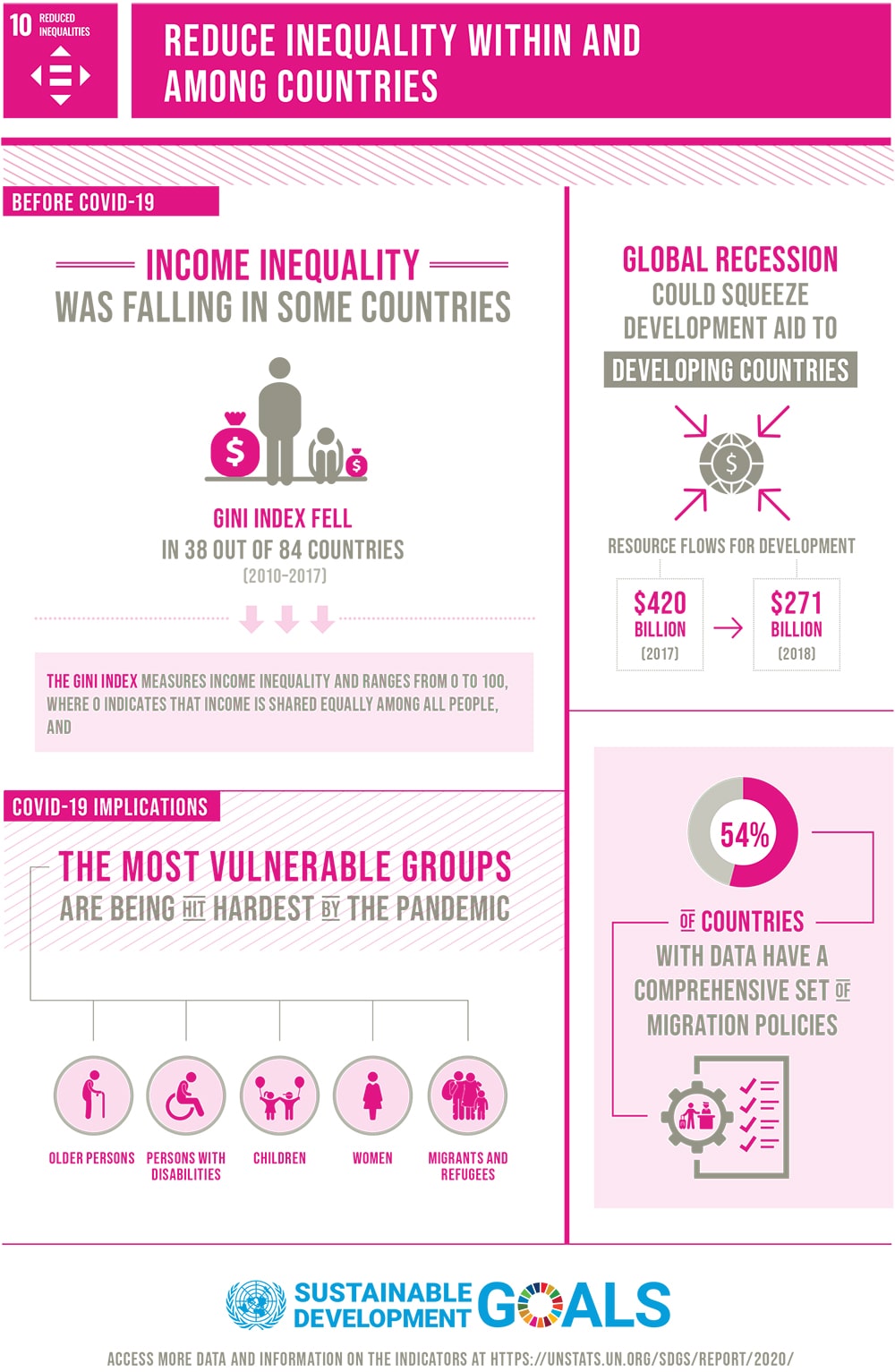Why is eliminating inequalities important
For a society to sustain peacefully and prosper, any sources of conflict and disharmony must be eradicated. Conflicts arise out of opposing forces due to dissatisfaction or greed. Dissatisfaction arises from unequal treatment, discrimination and oppression. The consequent inequalities cause a disturbance not only in the harmony of the society but also does not allow for a society to progress further economically and socially.
Inequalities also give rise to poverty and halt the socio-economic development of the people facing the discrimination, as well as reduce the overall living standards. This leads to an increase in disease. Discrimination and oppression also births crime, by taking away from vulnerable groups’ right to actualizing their self worth and sense of fulfillment.
Without basic resources that each human needs, minorities and vulnerable groups lack the education towards sustainable living and are forced into occupations that either contribute to environmental degradation or place them in the forefront of climate change. Most importantly, excluding people from an equal platform of participation and decision making in the society, defeats the purpose of what sustainable development stands for.
Inequalities exist on the basis of race, sex, religion, disability, ethnicity, sexual orientation, income etc among others. Discrimination takes place on basis of these identities, wherein one identity is treated inferior to other, thus depriving them of basic human rights and resources. As per the Sustainable Development Goals Report-2020, at least every two out of ten people have experienced discrimination based on the grounds as set by the international human rights law.

Understanding the root cause for inequalities
Inequalities come from a relation between two or more groups of individuals, wherein one assumes the role of the oppressor and subjugates the oppressed. This relation comes from conflict of interests or superiority complex, with the oppressor hailing themselves as the superior beings, as masters and/or as heroes who came to provide salvation to the oppressed groups.
It also arises from resentment towards a group of people, either due to misplaced stereotypes or because of a false narrative of threats.
Irrespective of the source of discrimination, inequalities arise in unstable and unjust societies, thus marking the socio-economic backwardness which is an indicator of the discrimination tha takes place. That is, to state that depriving people of their rights and treating them unequally breeds economic backwardness, environmental harm and crime. Inequalities and discrimination is also present in developed and democratic societies which have not let gone of their poverty, racism and xenophobia.
The inequalities are in the forms of lack of healthcare, unequal pay, unequal opportunities, lack for education etc. According to UNDP income equality has risen exponentially in the past decade with 40% of global income being retained with the richest 10%, and the poorest 10% accounting to only 2-7% of the global income.
According to the Sustainable Development Goals Report-2020 the coronavirus pandemic has caused disproportionately negative effects, with the vulnerable groups experiencing discrimination facing the greatest damage.
Changemakers fighting inequality
The different forms of the evil discrimination and inequalities bring, have different solutions and stances fighting against it. An inclusive approach across global, national and local levels is essential to eliminate the problems in its roots. Fight Inequality is an organization that functions on an international scale, which has over a 200 member alliance across NGOs, faith based groups, human rights organizations, women’s rights groups etc, to fight against the rich centric wealth and power. There are other organizations such as GiveDirectly which work towards the economic injustice of the wealth gap. A Continuous Charity is an organization in the United States that provides financial and social support to Muslim-Americans in order to integrate them into the society. Center for Social Action is an Indian organization that works towards human rights preservation and prevention of social injustices, through a network of local NGOs. The Humsafar Trust is a community based organization that stands for the rights and health of people belonging to the LGBT+ communities, through advocacy in the form of workshops, sensitisation etc.
What youth can do as a TAL transformer
Inequalities persist in spheres and facets of life, both within and out of our interactions. It is essential to tackle the source of discrimination while educating regarding and respecting the identity of the oppressed and vulnerable.
What you as a transformer for the society can do, is use social advocacy, philanthropy and entrepreneurial/business ideas in an innovative manner to provide a progressive direction for reaching the goal. Instances of which are as follows:
Social Advocacy
- Rally for social protection and special considerations such as reservations
- Rally for elimination of discriminatory laws and policies
- Advocate for safe and secure movement of migrants hailing from war torn or economically devastated countries
Social Philanthropy
- Invest in healthcare and education
- Invest in social protection
- Regulation and monitoring of financial markets
Social Entrepreneurship
- Generate inclusive and equitable employment with fair pay
- Develop differential based merit disclosure
- Provide developmental assistance and financial flows
References
United Nations (2020). The Sustainable Development Goals Report 2020. New York: United Nations, Department of Economic and Social Affairs. Retrieved from https://unstats.un.org/sdgs/report/2020/
https://www.undp.org/sustainable-development-goals#reduced-inequalities
Sustainability Program Manager
